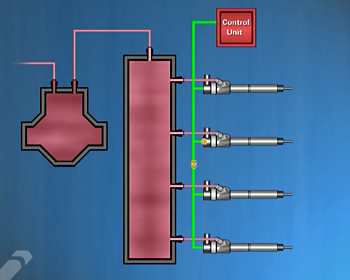Electronic controlled diesel systems give very precise control of the fuel injection and combustion process.
Diesel engines are subject to very high stresses during compression and ignition, and increasingly stringent emission standards have made better control of the diesel combustion process necessary.
Electronic controlled diesel systems give very precise control of the fuel injection and combustion process. Electronic controls have delivered other benefits besides a reduction in fuel consumption and emissions, such as an increase in power and torque; improved engine responsiveness; a reduction in engine noise and diesel knock; and improved and expanded diagnostic capabilities through the use of scan tools.
Diesel electronic control systems monitor and control many variables, including:
-
Engine speed:
- to maintain a smooth functional idle,
- and to limit the maximum safe engine speed, power, and torque;
- and to keep the engine output to within safe limits.
-
Fuel injector operation:
- including the timing, rate and volume of fuel injected.
-
Glow plugs and heater elements:
- Control of pre-heating of the intake air to support quick cold starting and reduced cold run emissions.
-
Exhaust emissions:
- Analysis of exhaust gas to determine combustion efficiency and pollutants.
-
And the data bus:
- An electronic communications network that allows exchange of data between computers - necessary for efficient operation and fault diagnosis.
Other inputs monitored include:
- crankshaft position,
- throttle position,
- brake and clutch operation,
- battery voltage,
- cruise control request,
- air, oil fuel, exhaust and coolant temperatures,
- and intake air, oil and fuel pressures.









